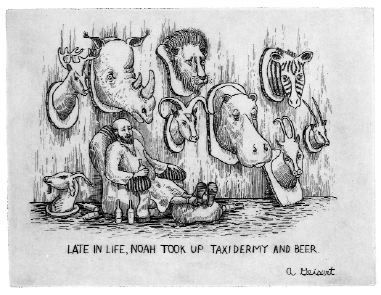Century Marks

Not in the genes: Having mapped the human genome, Francis Collins is one of the premier geneticists in the world. He is also both a Christian and a staunch advocate of the theory of evolution. He was home-schooled and brought up on a Virginia farm with no running water by Yale-educated parents, who had returned to the land as part of a rural-community project. Collins wrote a dissertation at Yale on quantum mechanics, then earned a medical degree and moved into genetics. He came to Christianity by observing the faith of terminally ill patients and by reading C. S. Lewis’s Mere Christianity. One morning, while taking a hike in the Pacific Cascades, he came upon a large, frozen three-stream waterfall, which struck him as an image of the Trinity. He “knelt in the dewy grass as the sun rose and surrendered to Jesus Christ” (Time, July 17, review of Collins’s The Language of God: A Scientist Presents Evidence for Belief, Free Press).
Thou shalt not bear false witness: If the Ten Commandments are posted in courtrooms, as some Christians argue they should be, then they should also appear in prosecutors’ offices, interrogation rooms and evidence labs, says Old Testament professor Patrick Miller, newly retired from Princeton Theological Seminary. Evidence has shown that in some criminal cases aggressive prosecutors use false testimony to gain convictions—a direct violation of the commandment against bearing false witness. Miller is working on a book about the Ten Commandments (Society of Biblical Literature’s international conference, Edinburgh, July 2-6).
God in a pill? A Johns Hopkins University School of Medicine study tested psilocybin, the active agent in so-called sacred mushrooms, to determine whether it could induce “mystical experiences” in a group of 36 adults with religious backgrounds. More than 60 percent of the study subjects said psilocybin produced a “full mystical experience,” and one-third said they enjoyed “the single most spiritually significant experience of their lifetimes.” Some likened the occasion to the birth of their first child. Possession of the substance (except for purposes of scientific research) is illegal in every state except Florida and New Mexico. The director of the National Institute on Drug Abuse, Nora Volkow, cautioned, “Although there is no evidence that psilocybin is addictive, its adverse effects are well known” (Religion News Service, July 12).
Wal-Mart gets religion: In an apparent attempt to improve its image, Wal-Mart Stores Inc. has hired a former nun to advise the company on issues of the environment, health care and labor relations, according to the Washington Post (July 18). Harriet Hentges, who once belonged to the Sisters of St. Joseph of Carondelet and has served as a conflict mediator, has been named to the new position of senior director of stakeholder engagement. Hiring Hentges is one move in a series of publicity stunts, said a spokesperson for Wake Up Wal-Mart, a group critical of Wal-Mart’s labor practices. The group said that Wal-Mart “must become a better company that pays a living wage, provides affordable health care and reflects the best of American values.”
Sinking feeling: Many people cast the ashes of deceased loved ones upon the sea. With the help of Eternal Reefs, an Atlanta-based company, people can do something environmentally friendly with the ashes. For a fee, cremated remains are combined with marine-grade concrete to form an artificial reef called a “reef ball.” The reef balls are dropped into government-protected reef beds off the southeastern coast of the U.S. Once on the ocean floor, reef balls create a rocky ecosystem that is hospitable to marine life. Eternal Reefs has handled the remains of more than 350 people and animals since 2001. “This is where he’d want to be, his last fishing trip,” said one woman about spreading her husband’s ashes this way (Atlanta Journal-Constitution, July 17).
Popcorn target: You have to wonder what those Amish are up to. The Amish Country Popcorn factory in rural Indiana appears on a Homeland Security list of possible terrorist targets, along with Old MacDonald’s Petting Zoo in Woodville, Alabama, and the Mule Day Parade in Columbia, Tennessee. The Homeland Security database is used to disburse antiterrorism grants to states and municipalities. “We are nothing but a bunch of Amish buggies and tractors out here. No one would care,” said Brian Lehman at the popcorn factory. His only explanation for why terrorists might care: “Maybe because popcorn explodes?” (New York Times, July 12).




